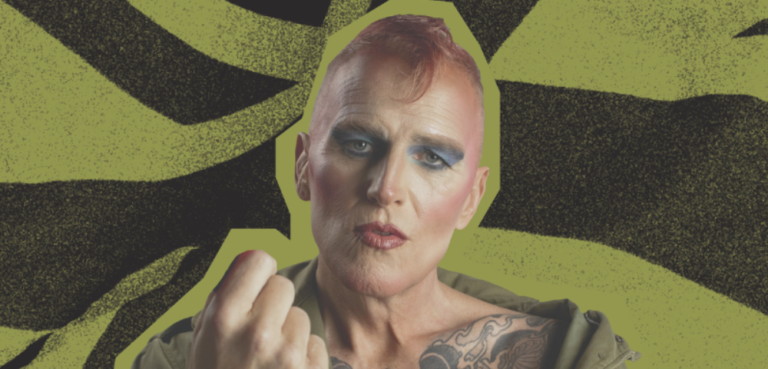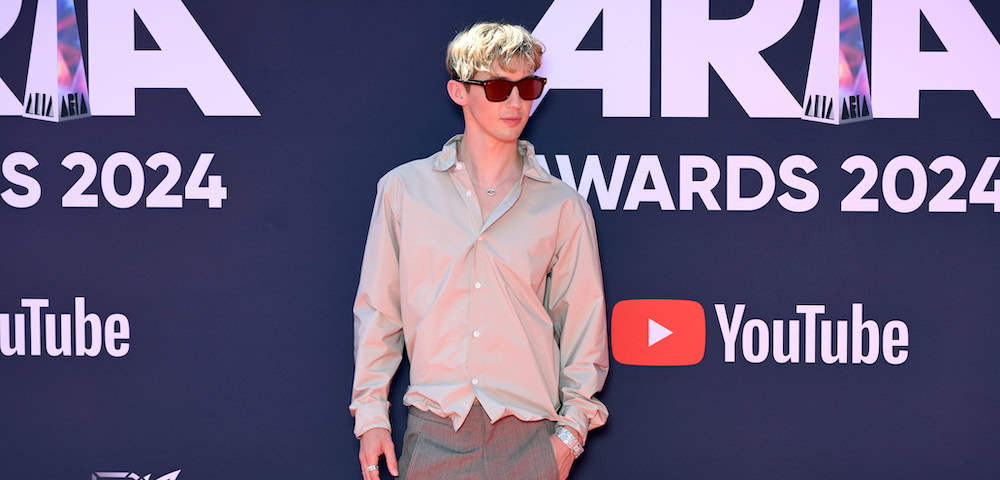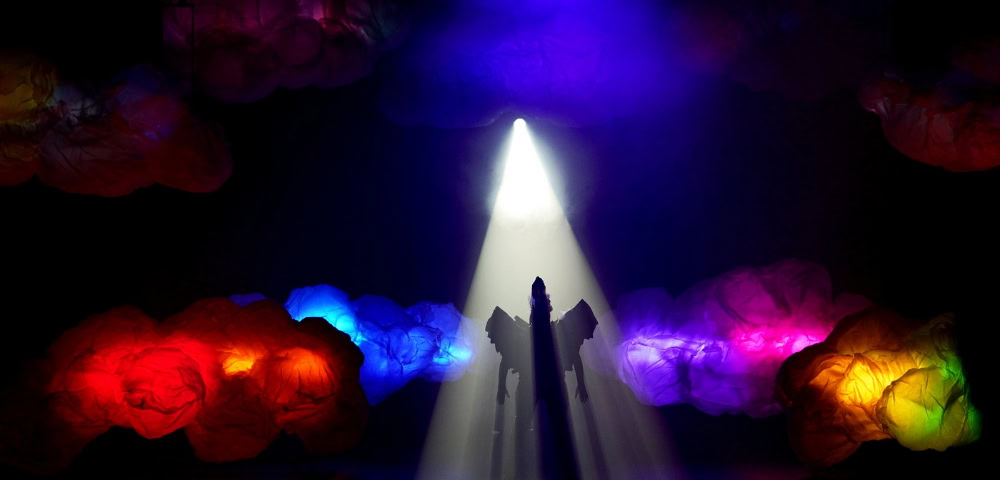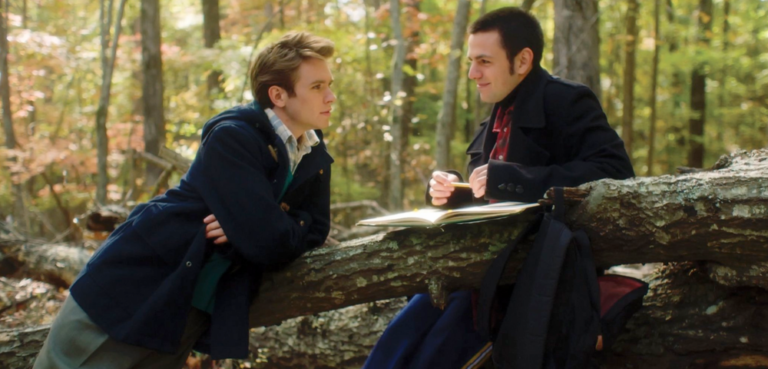
Rainbow Streaming with Mama Alto
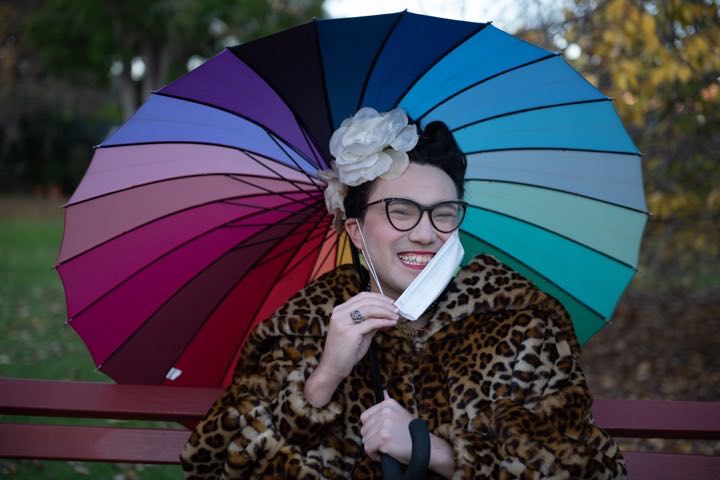
Sometimes when you’re interviewing people, there’s a gem of a quote that just has to make it into the piece, even if it means rearranging all the work you’ve done. And so it is with Mama Alto, who commented (perfectly within context, I should add), “I just like to sparkle. I like to give people the gift of singing, and I like to eat. Those are the things I like to do.”
And sparkle she does. When my husband and I heard Mama Alto sing live last year, she held the room spellbound with her soaring voice. And between those transcendent high notes, she told stories, bantering and chatting and making you feel like the show was just for you. She’s a talented cat.
So understandably, I was nervous when I sat down to interview her. But it turns out the performance is real: in person, Mama Alto is just as delightful as she is on stage. And, it transpires, my experience was exactly what she had planned: “What constitutes the performance, the artwork is actually happening in the relationship between me and the audience… the connection is the artwork.”
It also turns out the pre-interview nerves cut both ways. Mama Alto thinks comedians are “cool” and “clever” in a way cabaret singers are not. If only she knew how much time I spend thinking about my worm farm.
As we discuss her role as one of the artists featured in Global Pride, a 24 hour stream that will be launched in June, we move to the challenges of translating her art form to digital mediums. It’s a transition made out of necessity rather than choice in the midst of global upheaval. She is frank about the tribulations of performing online: the expectation to perform for free, the lack of feedback from the audience, the pressure of doing your own sound and lighting. But, she points out, there are upsides: “If there’s just one person out there who watches my livestream or my video, and it makes them feel a little bit less alone, just for a moment, that is the key to delivering these online performances. That power to reach into people’s hearts and people’s homes, when they are feeling trapped there and scared and alone and like they cannot connect to their communities and to the outside world.”
And in some ways, she says, these times have simply reminded us of timeless truths about performing: “You have to accept that you may never know what difference you have made to somebody’s life. Because not everyone will cheer or come to the stage door or tell you what you meant to them.”
Like any good progressive queers, we move on to a critical analysis of performing under late capitalism (although, as she reminds me, to call it “late” is at the very least optimistic). Again, some truths are timeless (“we don’t do it for the money, but the money helps us survive”) but one suspects Mama Alto is sharpening her (verbal) knives for the day she meets the person who started That Shakespeare Meme: “Shakespeare had Queen Elizabeth I and then after that James I of England, paying him a stipend. They were literally throwing gold at him to producethese plays, even during quarantine. His performing company was literally called the King’s Men, because the King was paying them just to be there.”
Mama began a new job with MidSumma just as the pandemic began, and she is quick to acknowledge her “economic privilege” (our standards having fallen to the point where one must be grateful for such things as a wage, even someone who has clearly earned that position several times over). It’s a role, though, that clearly means much more to her than cash: “Artist development, and facilitating pathways for growth and opportunity for emerging and early career artists, that’s something I’m passionate about. It’s something other practicing artists gave to me on my journey and helped me become who I am. But a lot of emerging artists don’t get that…it’s something I’ve always tried to do in my career.”
She calls it her day job, but she’s also spending her evenings combing Patreon for crowdfunding campaigns she can contribute to and using her copious number of social media followers to promote other artists. She explains, “I want to contribute positively to other artists – that was my initial motivation. But I’ve found that has been the greatest act of self-care, keeping me sane, trying to do what I can do to help others. ”
Mama indeed.
We wonder together whether the virus has changed things for good, but we end on a note of hope (actually, we finish with my husband barging into the room and handing me a handwritten note demanding that I ask Mama for advice on singing technique, but we’ll just politely ignore him*).
“I do have immense faith in the audience-performer relationship. You know when radio first came along, when the novel first came along, when television first came along, when the movie first came along, when records came along, when Edison’s wax cylinders came along, people said, Oh, you know, well, that’s the end for live performing arts because why would you leave the comfort of your home.
None of it ever killed the live performance scene, because there’s something intrinsic about coming together, collectively and experiencing a communal experience, a relationship. We are only the conduit for a collective imagining into existence of feeling. People gather, we imagine together through the conduit of the artist and we collectively experience what it is to be human.”
*It turns out, Mama tells me, that singing is a lot like queerness: we start out fabulous, but we internalise society’s blockages at an early age and often need to reclaim ourselves as adults. It takes a lot of hard work to find our way back to it, but once we do, we are fierce. In the end, it was a great question. Thanks, husband.
